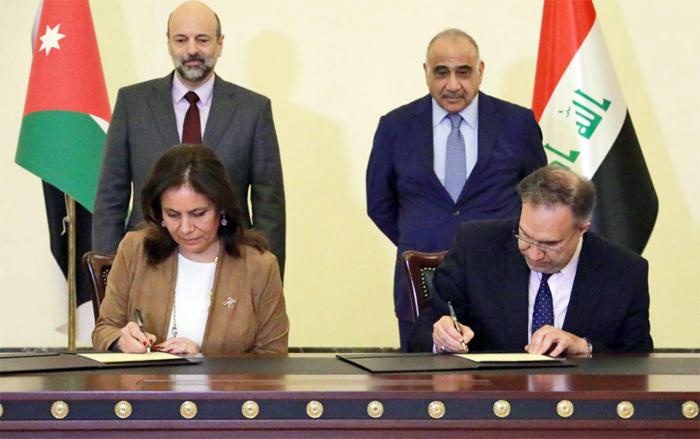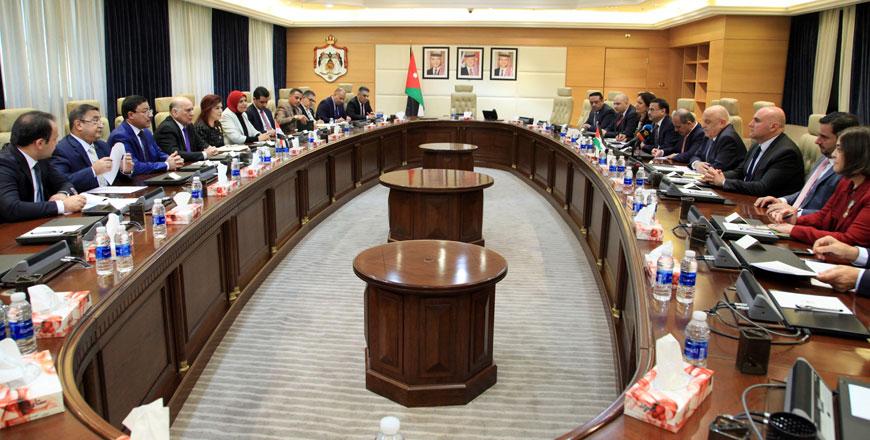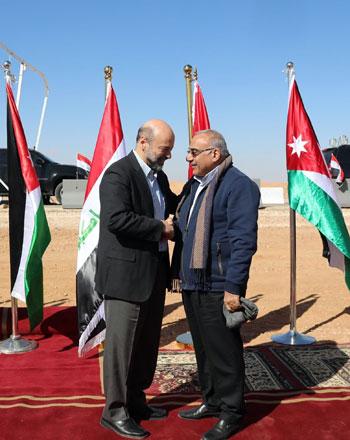You are here
Jordan, Iraq premiers set timeline for historic economic cooperation projects
By Abdul Rahman Bazian - Dec 30,2018 - Last updated at Dec 30,2018

Minister of Energy and Mineral Resources Hala Zawati and Iraqi Minister of Electricity Luay Khatib sign a MoU to connect the power grids of Jordan and Iraq in the presence of Razzaz and Abdul Mahdi on Saturday (Photo courtesy of Prime Ministry)
BAGHDAD — A ministerial delegation to Baghdad headed by Prime Minister Omar Razzaz on Saturday signed a memorandum of understanding (MoU) with the Iraqi government to link the Iraqi power grid to Jordan’s.
Extensive talks between Jordan and Iraq over the weekend covered the Basra-Aqaba oil pipeline, the regional railroad, customs exemptions on Jordanian exports to Iraq as well as the establishment of a joint industrial estate over an area of 24 square kilometres on the border, among various other topics.
In press remarks at the Iraqi prime ministry in Baghdad, Razzaz said the two sides agreed on multiple schemes to boost cooperation on all levels.
“The date set to revisit the implementation of these agreements is February 2, a date as ambitious and daring as our aspirations and efforts,” the premier said.
Jordan has taken wide strides to ensure Iraq’s interests are secured, Iraqi Prime Minister Adel Abdul Mahdi noted.
Those were one of “the most successful talks ever entered”, the two prime ministers concurred.
Also on Saturday, Razzaz met with Iraqi President Barham Saleh in Baghdad, during which the premier and the president stressed the need to foster the “brotherly ties” between the two countries and went over the “fruitful” agreements reached earlier in the day, the Jordan News Agency, Petra, reported.
Energy cooperation
In a joint communiqué released later in the day, the two sides said that measures to accelerate the process of exchanging electrical power would “begin immediately” through directly connecting the two countries’ power companies.
The MoU for the planned link was signed by Minister of Energy and Mineral Resources Hala Zawati and Iraqi Minister of Electricity Luay Khatib, and aims aims at enhancing the stability of both countries power grids, according to the communiqué.
In regard to the Aqaba-Basra oil pipeline, the framework agreement would be concluded during the first quarter of 2019, as technical committees are set to decide on pricing and transportation mechanisms of Iraqi oil to the Kingdom by February 2 as well.
Earlier this month, during a visit by an Iraqi ministerial delegation to Amman, the two sides discussed the possibility for Jordan to import Iraqi oil at preferential prices.
The oil pipeline is expected to provide Jordan with at least 10,000 barrels of oil daily, in addition to the benefits that come from exporting via the Aqaba Port, Razzaz explained.
“Which is not much, but it helps drive down energy costs domestically, especially for industrialists and exporters,” he added.
Trade recovery
In a closed meeting with media representatives, Razzaz confirmed that the new measures were pressed to accelerate trade recovery.
“A door-to-door mechanism was agreed on, to substitute the back-to-back freight shipping mechanism, which is inefficient, both in terms of cost and time wasted,” he explained.
Procedures were set in motion to ease visa protocols for freight transport through the Karameh-Turaibil Border Crossing, Razzaz added, which will eventually “increase the competitiveness of Jordanian exports to Iraq... in addition to the exemptions which are expected to be ratified very soon”.
The border crossing was reopened last year, after a three-year closure, and trade was resumed between the two countries; however, Jordanian trucks, so far, have not been able to enter Iraq due to security reasons, unloading cargo at the border instead, to be reloaded onto Iraqi trucks.
Earlier on Saturday, Iraqi Ambassador to Jordan Safia Al Suhail, who attended the meetings, told The Jordan Times that the issue hurdling exemptions for Jordanian exports to Iraq is “merely a misunderstanding”.
The press statement noted that the Iraqi government’s decision regarding customs exemptions for Jordanian products was activated during the visit, and that it would go into effect on February 2.
“The two countries are bound by an agreement that ensures Jordan an advantage over any of Iraq’s neighbours and friends, in terms of trade,” Suhail said. “Jordanian-Iraqi ties are outstanding.”
More so, Iraq’s Minister of Industry and Minerals Saleh Jubouri told The Jordan Times that he expects Jordanian exports to Iraq to “double by the end of 2019”.
Despite the uncompetitive prices, a source in the direct investments department at the Jordanian Embassy in Baghdad told The Jordan Times that Iraqi consumers have confidence in Jordanian products, which is an advantage for Jordanian exports over competitors.
“The Iraqi market is overrun by Turkish products, as well as Iranian exports, though to a lesser extent,” the Iraqi minister warned.
But Suhail says the efforts enacted to develop joint industrial projects, including the (industrial) estate, will definitely boost the competitiveness of Jordanian products.
Meanwhile, Mahdi announced that the two sides agreed on a 75 per cent discount on fees for Iraqi exports via Aqaba, adding that the list of exempt Jordanian exports to Iraq will be revisited to boost trade, as long as these products do not pose a threat to Iraqi commodities.
Joint industrial estate and outstanding files
Also by February 2, the land stretching 2km on each side of the Jordanian-Iraqi border agreed upon by both countries would be given the needed exemptions to set up a Jordanian-Iraqi joint industrial zone, and necessary tenders would be floated for the zone’s establishment.
A build-operate-transfer mechanism will be adopted to execute the plan through the private sector, the two premiers announced.
Prospects of security, ICT and agricultural cooperation were explored in the meetings, they said, including the resumption of the Jordanian-Iraqi fibre-optic network to enhance both countries’ Internet services and the collaboration on counterterrorism efforts.
“Iraq is Jordan’s lung and supporter, and so is Jordan to Iraq,” Abdul Mahdi added.
Negotiations delivered resolutions to several outstanding issues, including unsettled financial cases dating back to 1991.
“We have outlined a specific and clear timeline and mechanism for the resolution of tangled financial issues,” Razzaz said.
In the joint statement, the two premiers announced the establishment of a joint legal-financial committee to handle and close these outstanding files.
A slice of the rebuild Iraq project
Meanwhile, Razzaz promised to facilitate access for the Jordanian construction contractors to the Iraqi market, especially in regards to the reconstruction project, noting, however, that “we will not be alone”.
“It is up to the Jordanian construction sector to stage a solid footing for the reconstruction project,” he underlined.
Both premiers expressed appreciation for the promising efforts and willingness “exemplified by these talks and the many steps taken to expedite measurable outcomes”, Razzaz said.
“There is clear resolve and willingness on the Iraqi part to see these agreements through,” noted Minister of State for Media Affairs and Government Spokesperson Jumana Ghunaimat to the press during the meeting with Razzaz.
Several other issues were addressed during the meetings, including the exchange of expertise, particularly in the agricultural and technology sectors.
“In fact, we have achieved, in these talks, more than we would otherwise achieve over months,” Razzaz said.
Related Articles
BAGHDAD — A ministerial delegation to Baghdad headed by Prime Minister Omar Razzaz on Saturday signed a memorandum of understanding (M
AMMAN — Jordan and Iraq on Wednesday stressed their keenness to enhance economic relations, and discussed the import of Iraqi oil to Jordan
AMMAN — Jordan and Iraq on Saturday agreed that the latter would supply the former with 10,000 barrels of Kirkuk oil daily, as the door-to-d


















